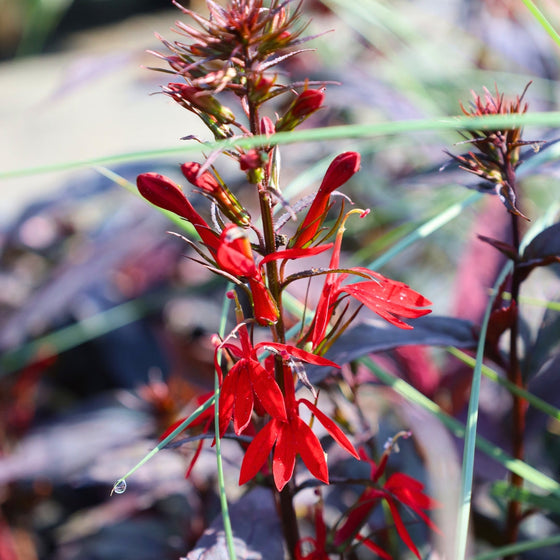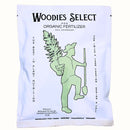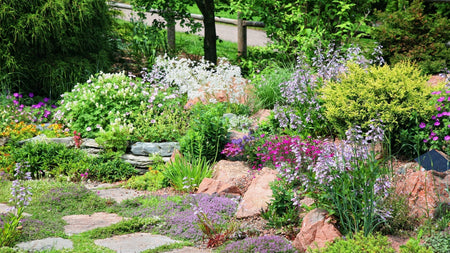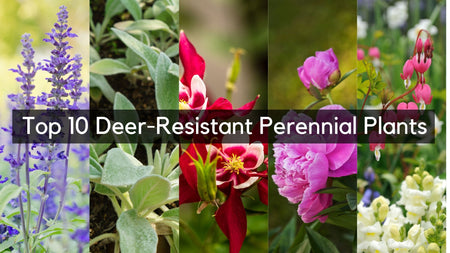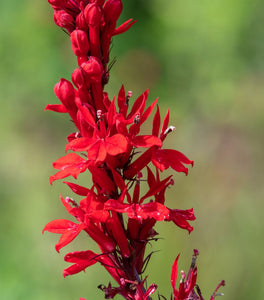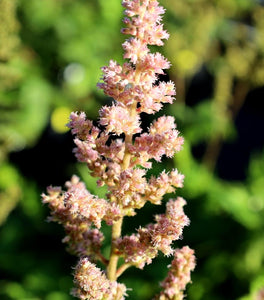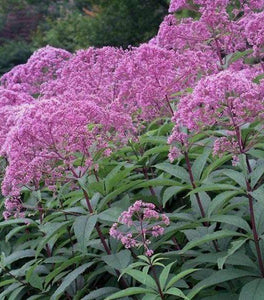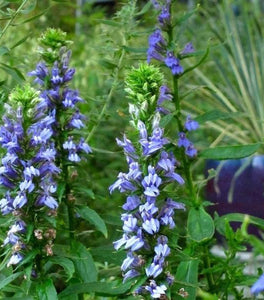
Images Depict Mature Plants
Lobelia Black Truffle
Lobelia 'Black Truffle' (Lobelia cardinalis 'Black Truffle') is a bold and beautiful native perennial prized for its dramatic dark foliage and striking red blooms. This stunning variety features deep, chocolate-purple leaves that contrast brilliantly with tall spikes of vivid scarlet flowers from mid to late summer. The intense coloration and upright form make 'Black Truffle' a standout in any pollinator garden, rain garden, or moist border planting. Its eye-catching presence adds depth and drama to perennial beds while attracting hummingbirds and butterflies throughout the blooming season.
Unlike many ornamental plants, Lobelia 'Black Truffle' thrives in consistently moist or wet soils, making it a perfect choice for areas near ponds, streams, or low spots in the landscape. It also performs well in rain gardens or woodland edges where partial shade and damp conditions prevail. This cultivar grows 3 to 4 feet tall and maintains a clumping, upright habit that lends structure and color contrast to native plantings and naturalistic designs. Its tolerance for moisture and resistance to deer make it a reliable and easy-care option for eco-friendly gardeners.
Hardy in USDA Zones 3–9, Lobelia 'Black Truffle' is a long-lived perennial that brings multi-season interest, ecological benefits, and bold color to the landscape. Its native roots support local pollinators, and its unique foliage ensures visual interest even when not in bloom. Whether planted in mass for a dramatic effect or used as a striking accent, this variety delivers rich color, texture, and wildlife value all in one package. Add Lobelia 'Black Truffle' to your garden for a lush, low-maintenance perennial that’s as eye-catching as it is beneficial.
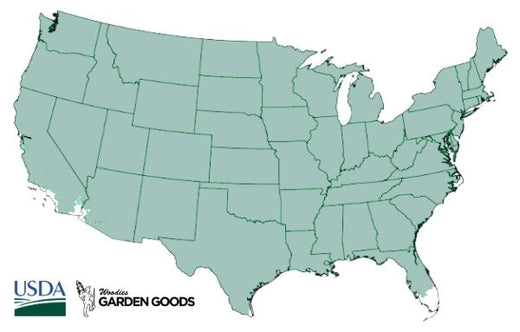
| Hardiness Zone: | 3-9 |
|---|---|
| Mature Height: | 2 to 4 Feet |
| Mature Width: | 1 to 2 Feet |
| Classification: | Flowering perennial |
| Habit: | Upright |
| Flower Color: | Red |
| Foliage: | Deep burgundy-red |
| Attracts: | Hummingbirds and butterflies |
| Soil Condition: | Prefers moist soil; can tolerate mild flooding |
| Water Requirements: | Water frequently, do not let dry out |
How to Care for Lobelia Black Truffle
Before you purchase your Lobelia Black Truffle plant, be sure to read the recommended care instructions to ensure your plant remains happy and healthy for years to come!
How do I plant a Lobelia Black Truffle Plant?
To plant a Lobelia 'Black Truffle' (Lobelia cardinalis 'Black Truffle'), choose a site with consistently moist to wet soil and partial shade to full sun. This moisture-loving native perennial thrives in rain gardens, near water features, or in low-lying areas of the landscape where soil stays damp but not waterlogged. Start by digging a hole twice as wide and just as deep as the plant’s root ball. Gently loosen the roots before placing the plant in the hole, ensuring the crown sits level with the soil surface. Backfill with rich, organic soil and water thoroughly to settle the roots and eliminate air pockets. Spacing is also important—plant Lobelia 'Black Truffle' about 12 to 18 inches apart if planting in groups to allow for air circulation and mature growth. Mulching around the base of the plant with organic material such as shredded bark or leaf mold will help retain soil moisture and suppress weeds. This variety is best planted in spring or early fall to allow roots to establish before extreme temperatures. With proper planting and a moist location, 'Black Truffle' will reward you with lush, dark foliage and towering spikes of hummingbird-attracting red blooms during the height of summer.
How often do I water a Lobelia Black Truffle plant?
Watering a Lobelia 'Black Truffle' (Lobelia cardinalis 'Black Truffle') correctly is key to maintaining its vibrant foliage and stunning scarlet blooms. This moisture-loving perennial thrives in consistently damp to wet soil, so it’s essential to keep the soil evenly moist, especially during hot or dry periods. Unlike drought-tolerant plants, Lobelia 'Black Truffle' should never be allowed to dry out completely. Water deeply two to three times a week during its first growing season, ensuring that the moisture reaches the root zone. In naturally wet areas or rain gardens, supplemental watering may be reduced depending on rainfall and soil conditions. Once established, Lobelia 'Black Truffle' still requires regular watering to maintain its health and flowering potential. In container plantings or drier landscapes, daily watering may be necessary during peak summer heat. Adding a thick layer of organic mulch around the plant can help retain soil moisture and reduce the frequency of watering. Because this native perennial is adapted to wet environments, it's an excellent choice for low spots, pond edges, or areas that stay consistently moist—making it both a striking and functional plant in water-rich garden spaces. Proper watering supports the plant’s dramatic foliage and ensures a bold, pollinator-friendly display through late summer.
When Should I Fertilize My Lobelia Black Truffle Plant?
Fertilizing a Lobelia 'Black Truffle' (Lobelia cardinalis 'Black Truffle') properly encourages lush, dark foliage and an abundance of vibrant red flower spikes. In early spring, apply a balanced, slow-release fertilizer—such as a 10-10-10 or 5-10-5 blend—to support healthy root development and strong flowering. Spread the fertilizer evenly around the base of the plant, avoiding direct contact with the stems, and water well after application to help nutrients absorb into the soil. Since this variety thrives in rich, organic soil, adding compost or well-aged manure can enhance soil fertility and promote vigorous growth naturally. Avoid over-fertilizing, especially with high-nitrogen formulas, as this can encourage excessive foliage at the expense of blooms. If you’re growing Lobelia 'Black Truffle' in a rain garden or other moisture-rich area, you may need only one feeding per year, particularly if the soil is already nutrient-dense. In container gardens or less fertile soils, a second light feeding in mid-summer can help sustain flowering through the heat of the season. With moderate, well-timed fertilization, this native perennial will deliver bold color and wildlife-friendly performance all summer long in consistently moist garden spaces.

How and when do I prune my Lobelia Black Truffle Plant?
Pruning a Lobelia 'Black Truffle' (Lobelia cardinalis 'Black Truffle') is a simple but beneficial task that helps maintain its striking appearance and encourages prolonged blooming. The best time to prune is after the plant has finished flowering in late summer to early fall. Once the tall flower spikes have faded, cut them back to the base to tidy the plant and prevent unwanted self-seeding, especially in manicured garden spaces. Removing spent flower stalks also redirects the plant's energy into strengthening its root system and preparing for the next growing season. In early spring, inspect your Lobelia 'Black Truffle' for any dead or damaged foliage that may have accumulated over winter. Trim away any winter dieback to encourage healthy new growth and to maintain the plant's compact, clumping shape. This native perennial typically requires minimal pruning, but consistent seasonal cleanup helps reduce disease risk and keeps your rain garden, moist border, or pollinator bed looking fresh. With occasional pruning and cleanup, your Lobelia 'Black Truffle' will thrive, delivering dramatic foliage and vivid red blooms that attract hummingbirds and butterflies year after year.

